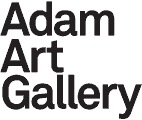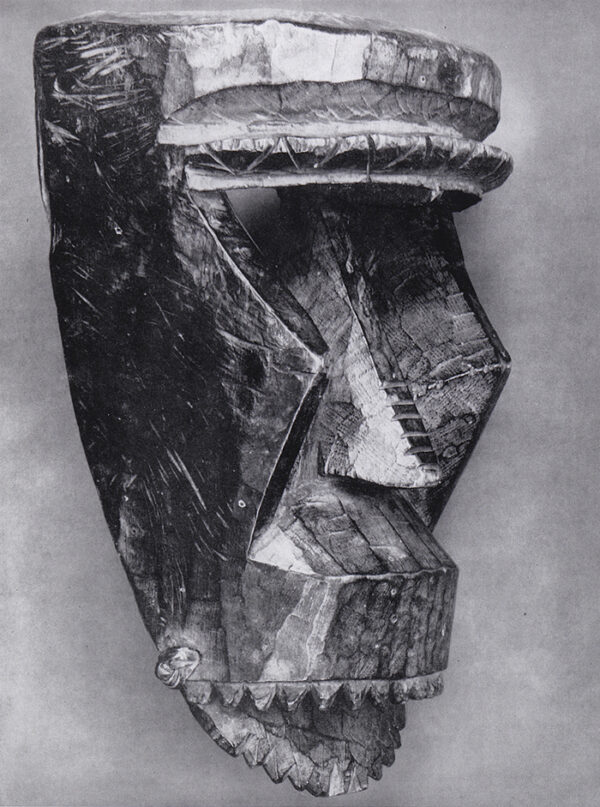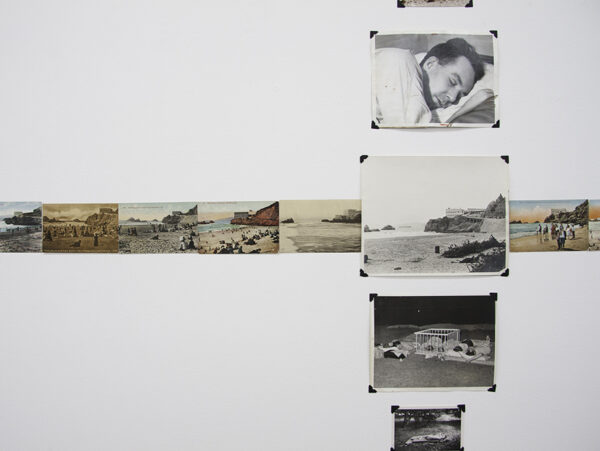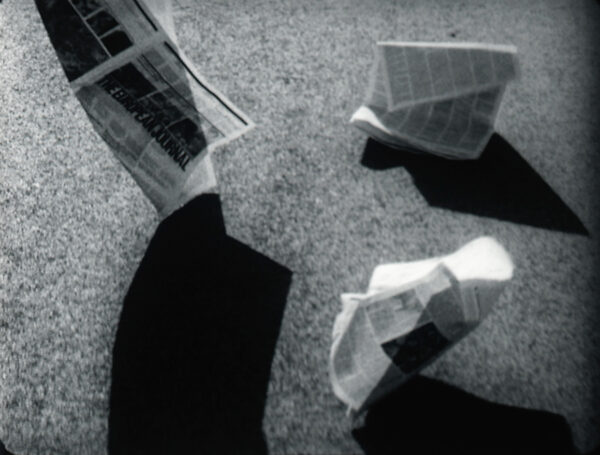Walker Evans: The Magazine Work / Sherrie Levine: African Masks After Walker Evans / Patrick Pound: Documentary Intersect / Sonya Lacey: Newspaper for Vignelli
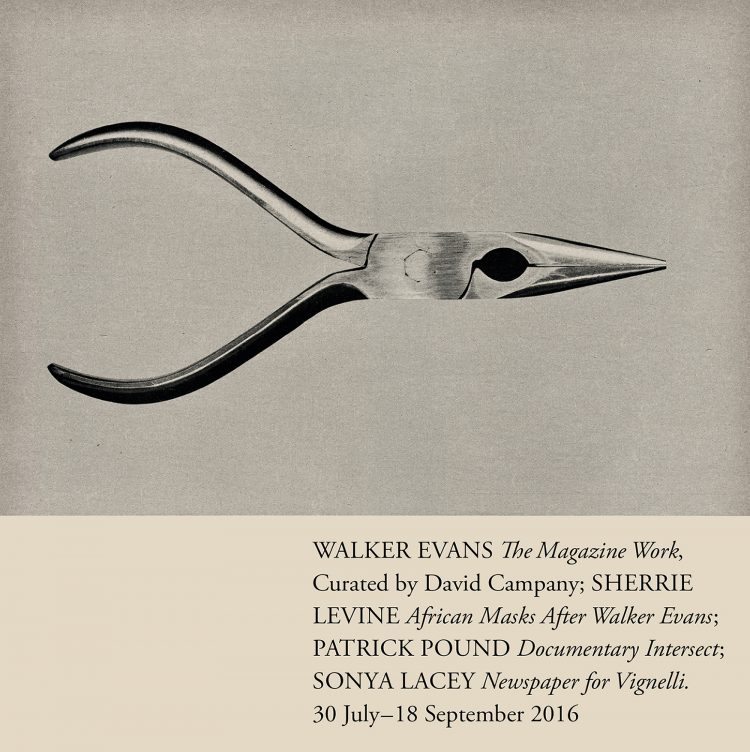
Walker Evans: The Magazine Work
curated by the Adam Art Gallery’s 2016 Clark Collection Curator in Residence, David Campany
Walker Evans (1903-1975) remains one of the most important and influential photographers in the history of the medium. His career spanned the emergence of the modern mass media in the 1920s to the full acceptance of photography as an art form in the 1960s and 1970s. Many of Evans’s individual images have become landmarks both of photography and the social history of that era.
This exhibition took a different look at Evans, placing the emphasis on his printed pages, and in particular his work for American magazines. Evans began to publish in 1929 and soon found ways to set his own assignments, write the accompanying words and design his layouts.
Working in both black and white and colour for nearly four decades, Evans used the popular magazine page to produce a resistant counter-commentary on American society and its values. Where the mass media enjoyed celebrity culture, Evans photographed anonymous citizens. Where the mass media promoted consumerism, Evans valued enduring objects and the persistence of the past in the present. His subjects included automobile junkyards, graffiti, shop window displays and postcards. These photo essays were often subtly at odds with the editorial line of the magazines that published them—notably Fortune, America’s prime magazine of big business and industry.
Evans was a pioneer of modern photography but on the magazine page we can see his understanding of context; the meanings of his images are shaped by editing, writing and design. Experimental and yet classical, these photo-essays have been overlooked until recently.
Walker Evans: The Magazine Work has been presented in several important venues globally, including MOCAK, Museum of Contemporary Art, Kracow, Poland, and the Palazzo Magnani, Reggio Emilia, Italy. This was its exclusive New Zealand presentation.
For more information on David Campany visit his website: http://davidcampany.com/
Listen to Lynn Freeman’s interview with David Campany on Standing Room Only, RadioNZ.
Media release available here.
Walker Evans: The Magazine Work received substantial support from Displayschemes, Wellington. Campany’s visit to Wellington was supported by The Clark Collection.
Click here to view the public programme events associated with this exhibition.

Sherrie Levine
African Masks After Walker Evans
American artist Sherrie Levine rose to prominence in the early 1980s as a key figure in what Douglas Crimp called the ‘Pictures’ generation, a loose group of artists who appropriated and re-issued existing imagery from high and popular sources. Rather than creating new works, they believed the artist was not able to produce anything original, given their submergence in a world already full of pictures. Levine’s provocative series titled After Walker Evans (1981) was a major contribution to this moment. Here she boldly scrutinised notions of originality and truth by meticulously reproducing 1:1 scaled copies of printed versions of Walker Evans’s seminal photographs produced in Alabama during the Great Depression. By lifting these subjects, Levine delivered a definitively post-modern blow, described as a ‘feminist hijacking of patriarchal authority, a critique of the commodification of art, and an elegy on the death of modernism’. By inserting distance between us and Walker Evans, and of course his famous subjects, she turned attention to the production of meaning itself, putting pressure on the image as a vehicle of truth.
In 2014, Sherrie Levine produced a new series: African Masks After Walker Evans, this time reproducing images Evans produced for the Museum of Modern Art in New York’s 1935 exhibition African Negro Art. Evans’s images were produced on commission, when the Museum hired him to document the large collection of African masks recently acquired by the institution. Levine presented a set of twenty images that subsequently appeared in the book African Folktales and Sculpture. While initially appearing as a simple act of copying, the quality Levine obtained from her new set of photographic prints forces us to observe miniscule differences between the publication plates and the photographs from which they were made.
Levine’s works were brought to the Adam Art Gallery courtesy of the artist, Simon Lee Gallery, London and the Walker Evans Archive at The Metropolitan Museum of Art, New York. This was the first time her work had been shown in New Zealand.
Click here to view the public programme events associated with this exhibition.
Patrick Pound
Documentary Intersect
I started by collecting things in order to inform my work. What seems to have happened slowly is that the collections eventually became my work.
– Patrick Pound
The New Zealand-born, Melbourne-based artist Patrick Pound has had a long-term engagement with the work of Walker Evans, both as a writer and as a practicing artist. For his solo exhibition at the Adam Art Gallery, Pound developed an installation comprised of found images, taking his cue from Walker Evans’s practice of working with readymade printed matter which he published in magazines such as Fortune and Architectural Forum.
While Pound’s collecting habits are voracious, he is also a great organiser. He is interested in typologies and arranges items according to shared content: ‘tears’, ‘floral clocks’, ‘crime scenes’, ‘sleepers’, and so on. Laying these out in linear sequences Pound discovers points of intersection to create complex grids of structured yet chaotic imagery. A Hollywood film still of a crime scene will sit eerily alongside an image of a real deceased subject sourced from an archive; or a set of postcards will show the same subject, shot by different photographers and describing both changing viewpoints and the passage of time. Pound has stated: ‘People make sense of the world through assembling, listing and categorising…meaning is to be found in the accumulation of [these] details.’
The publication Documentary Intersect associated with this exhibition is available for sale in the gallery and online here.
Click here to view the public programme events associated with this exhibition.
Patrick Pound’s exhibition was supported by Creative New Zealand Toi Aotearoa.
![]()
Sonya Lacey
Newspaper for Vignelli
Sonya Lacey’s Newspaper for Vignelli depicts a series of tracking shots which tail the pages of a newspaper as they continually tumble just-out-of-reach within a gusty outdoor setting. This video, which is transferred from 16mm film, was acquired for the Victoria University of Wellington Art Collection in 2012 as part of its new media collection initiative.
The newspaper depicted is not any-old daily tabloid. Lacey has carefully constructed a facsimile based on the European Journal (1978), a proposed-but-never-published newspaper designed by the well-known modernist graphic designer Massimo Vignelli (1931-2014). While only Vignelli’s mockup of his cover has survived, Lacey has imagined the journal’s complete contents, recreating Vignelli’s signature gridded blocks, uniformly scaled titles and bold sans-serif headers. Casting this design into a turbulent environment is her meditation on aesthetic hope, a consideration of the fate of ‘good’ design in a world of commercial imperatives.
Click here to view the public programme events associated with this exhibition.

